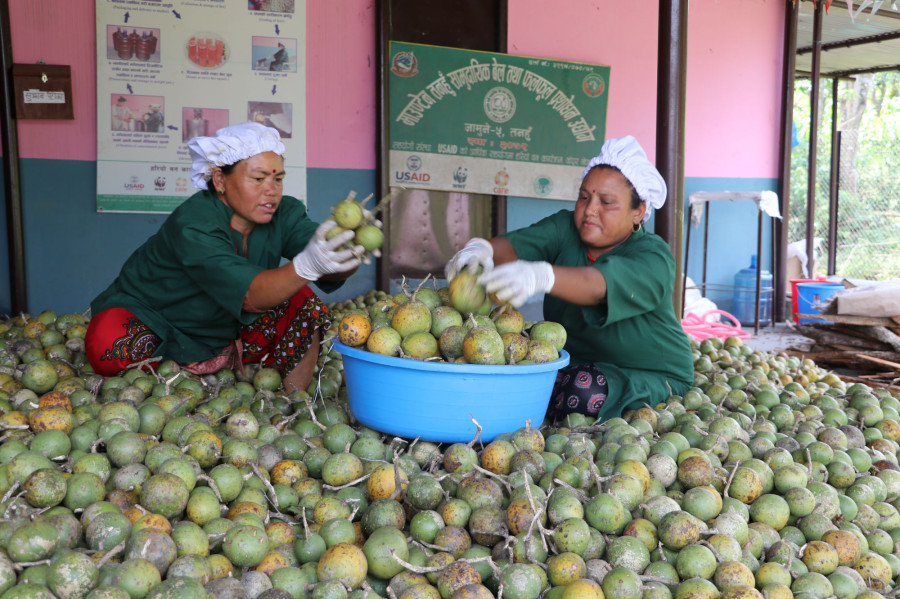Money
Wood apple juice factory turns boon for rural women
Established with an initial investment of Rs460,000 five years ago, the factory now provides jobs to 100 women
Pratap Rana Magar
There is a common proverb in Nepal, ‘Kaag Lai Bael Pakyo Harsha na Bismat,’ which means a crow is neither happy nor sad if bael (wood apple) ripens. That’s because the crow can’t eat the fruit as it can’t break the fruit with its beak. But for most of the women in Myagde Rural Municipality in Tanahu, the bael fruit has become a good source of income.
The juice factory came into operation two years ago which now provides employment for 100 local women. They are associated with different community forest user groups.
Demanded mostly in the summer, the fruit pulp is used as a juice by mixing it with water and ice. As per the book, “Encyclopedia of World Medicinal Plants,” the pulp mixed with cardamom, honey and cumin seeds remedy liver cirrhosis of malnourished children, piles, and diarrhea.
Sita BK, a community forest user, said that since the juice factory came into operation, it has made a large number of women financially independent. “They are also supporting the family with the income.”
“Two years back, most of the women in the village used to spend their days on household chores. But the opening of the juice factory has brought jobs to their doorstep,” she said.
Out of the total 100 women associated with the business, nine of them are engaged in producing juices, while 90 of them are engaged in collecting the fruit from different community-based forests. They earn Rs425 per day.
Hem Maya Thapa, a worker in the factory, said that until few years back, the fruit used to be wasted.
“Now, for many women, it has become a good source of income.” “We have been collecting the fruit from nearly a half dozen of community forests,” she said. The fruit juice is packed in 700 ml bottle and costs Rs210. A kilo of bael produces 1.5 litres of juice.
Normally, the fruit is collected from mid-April to mid-June period. A woman can collect 60 to 200 kgs of bael daily and earn Rs1,200-4,000, said Parbati Ranabhat, another beneficiary of the juice factory.
According to Ranabhat, the fruit can be stored for a year by extracting its pulp. “As the fruit is seasonal, dried pulp which can be stored enables the factory to run for a year.”
The factory was established five years ago but only started producing juice two years. Bishnu Kumar Shrestha, founder chairman of the factory, said the company made a profit of Rs500,000 in two years.
“We produce 5,000 bottles of juice a year,” he said. He added that they have planned to produce 10,000 bottles of juice annually. The juice is mainly supplied to Kathmandu.
The factory initially invested Rs460,000 which has swelled to Rs10 million. The bael tree has been planted on 120 hectares out of 650 hectares of the community forest. Nearly, 16,000 of bael saplings were planted in the community forest last year.
The factory was supported by the Division Forest Office, Tanahu, Green and Healthy Forest Programme and Cottage and Small Industries provided technical help.
“The project has seen active participation from community forest users particularly women,” said Kedar Baral, chief of the forest office. “Different organisations have been helping with market promotion.”




 22°C Kathmandu
22°C Kathmandu.jpg)














